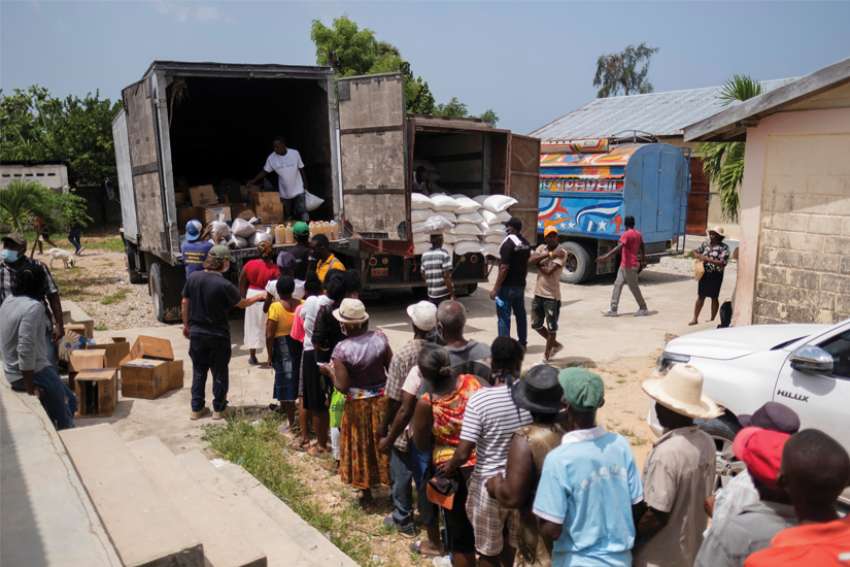The situation in the poorest country in the Western hemisphere has been overshadowed by so many other happenings in the world — Iqaluit’s water system has been compromised, the Taliban has retaken Afghanistan, China has flown military sorties over Taiwan, Hurricane Ida slammed into New Orleans, a volcano on the Spanish island of La Palma is still spewing ash and molten lava and Facebook was down for six hours.
But thanks to nearly $400,000 Development and Peace - Caritas Canada has raised on its website and through Canada Helps, Haitians are making their lives a little better day by day in the rural communities of Les Cayes, Maniche, St. Louis du Sud and Cavaillon.
Development and Peace’s Haiti plans are “ever evolving,” said the Catholic development agency’s program officer for Latin America Mary Durran.
“Our post-earthquake response is able to carry out operations quite satisfactorily, despite the current situation,” Durran told The Catholic Register.
That current situation includes political uncertainty in the wake of President Jovenal Moise’s July 7 assassination. There are also criminal gangs who have taken control of important roads that connect parts of the mountainous, island country to each other.
One of those gangs is responsible for the abduction of 17 missionaries from Christian Aid Ministries, including a Canadian, over the Oct. 16-17 weekend.
Politics in Haiti was already a mess before Moise was killed. The assasination “compounded the political crisis, and the earthquake was the final straw,” Durran said. “Despite all that, our partners are still working and advancing with their work.”
Gang control of the road from Jeremie to Port au Prince has been a major obstacle, said Chalice’s senior international manager MaryAnne McKinnon.
“The highway from Port au Prince to Jeremie has been cut off for a long time and it’s just too dangerous for people to travel,” McKinnon said. “In terms of movement of people, goods and supplies it’s almost impossible at times. When you’re responding to a major disaster like this, and you’re trying to move things, it’s very, very difficult.”
Chaos of all kinds makes getting winter crops in the ground and erecting new houses harder, said Durran.
“Trips to Port-au-Prince are more or less impossible and they have had to rely on local purchases for equipment, food and seeds,” she said.
Development and Peace’s primary partner on the rebuilding side of the operation is ITECA (Institut de Technologie et d’Animation). Caritas Haiti is the primary partner on the humanitarian side providing immediate relief.
ITECA had Development and Peace’s support when it built new houses for people left homeless after the 2010 earthquake. That experience is helping get shovels in the ground quicker this time.
Caritas Haiti has distributed food and the basics, from toilet paper to cooking utensils, to 1,400 vulnerable, poor families — over 10,000 people.
Chalice is channeling its disaster funds into building 23 temporary classrooms — cement pads and tents that protect teachers and students from the elements. Longer term, Chalice plans to rebuild schools, which were the priority identified by parents who are part of family circles Chalice has organized in the area. McKinnon estimates that an elementary school can be built for as little as $200,000 in Haiti.
But Chalice’s support goes beyond just the money.
“Our international operations manager for Haiti has been in daily contact with our site director, Br. Marcelin (Henri) at that site since the earthquake took place — every single day,” said McKinnon. “And we’re praying for them. They really feel that we’re there with them.”
The Development and Peace and Chalice contributions are small in the context of the $187.3 million the United Nations says is needed to stabilize Haiti, but they’re getting a bang for their buck by holding communities together, putting families in viable homes, giving kids a future and supporting local agriculture.


